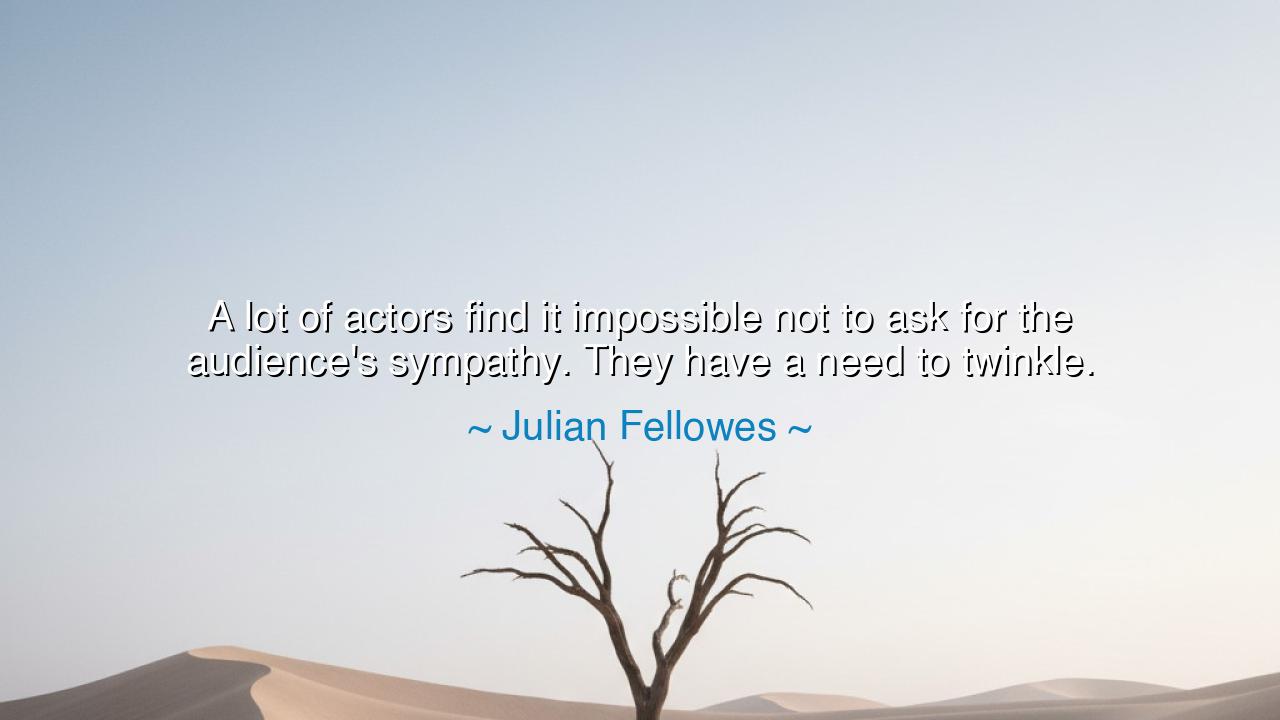
A lot of actors find it impossible not to ask for the audience's
A lot of actors find it impossible not to ask for the audience's sympathy. They have a need to twinkle.






Hear, O seekers of art and truth, the words of Julian Fellowes, who observed: “A lot of actors find it impossible not to ask for the audience’s sympathy. They have a need to twinkle.” In this saying lies a warning and a wisdom: that the stage and the screen are not places for vanity, but for truth; and that when the actor bends to the craving for applause, for charm, for the easy comfort of being loved, the sacred power of performance is weakened. For the purpose of art is not always to please, but to reveal.
The meaning is thus: many actors—bound by fear, pride, or hunger for admiration—seek constantly to win the sympathy of the audience. They soften harsh lines, they temper cruelty, they seek to “twinkle” even when the role demands darkness. But true acting demands courage: the courage to stand unsympathetic, to embody the villain fully, to live within the flawed soul without apology. Only in such truth can the art live. Fellowes, in his wisdom, reminds us that the need to twinkle is a trap, one that shackles the performer to ego rather than to character.
The ancients knew this temptation well. Consider the Greek tragedians, whose actors wore masks not to hide, but to free themselves from vanity. Behind the mask, there was no twinkling, no sly wink to the crowd, no plea for sympathy. There was only the raw embodiment of fate—Oedipus blinded, Medea raging, Agamemnon slain. The mask was a shield against vanity, forcing the actor to serve the story, not their own desire to be loved. This was the antidote to the very temptation Fellowes speaks of.
History offers us the tale of Richard III upon Shakespeare’s stage. The character is twisted, ambitious, cruel, a man who revels in villainy. Yet when portrayed truthfully, without begging for sympathy, audiences are enthralled. They despise him, yet they cannot look away. Here is the paradox: when an actor dares to shed the need to be liked, when they abandon the twinkle, they achieve a deeper connection with the audience—an honesty that grips the soul more powerfully than shallow charm ever could.
At the heart of Fellowes’ words lies the greater truth of all human endeavors: that authenticity is stronger than vanity. To twinkle falsely is to live for approval; to embody truth is to live for meaning. The actor who always seeks sympathy is like the leader who always seeks popularity, or the teacher who always seeks to please—each sacrifices depth for comfort. Yet those who live authentically, who dare to reveal what is hard, raw, and unsympathetic, give their audience something far greater than charm: they give them truth.
The lesson, then, is clear: do not live for the twinkle. Whether on the stage of art or on the stage of life, resist the urge to soften your truth for the sake of easy applause. Speak with honesty, even when it is uncomfortable. Embody the role you are given—whether villain or hero, whether honored or forgotten—with integrity, not with a desperate plea for approval. The world needs truth-tellers, not flatterers; it needs those who can hold a mirror up to life as it is, not as the audience wishes it to be.
What, then, should you do? Examine your own life. Ask yourself where you twinkle for approval, where you soften yourself to be liked, where you sacrifice truth for sympathy. Learn to let go of that need. Instead, practice courage: speak the harder word, embody the truer role, walk the path that does not glitter but that shines with integrity. In this way, your life will become not a shallow performance, but a deep testimony.
Thus let Julian Fellowes’ words echo: “They have a need to twinkle.” Take them as warning. For twinkling may win you applause, but only truth will win you immortality. And if you live by truth—whether in art or in life—you shall be remembered not as one who merely pleased, but as one who revealed the heart of reality itself.






AAdministratorAdministrator
Welcome, honored guests. Please leave a comment, we will respond soon